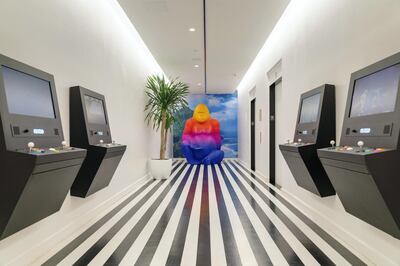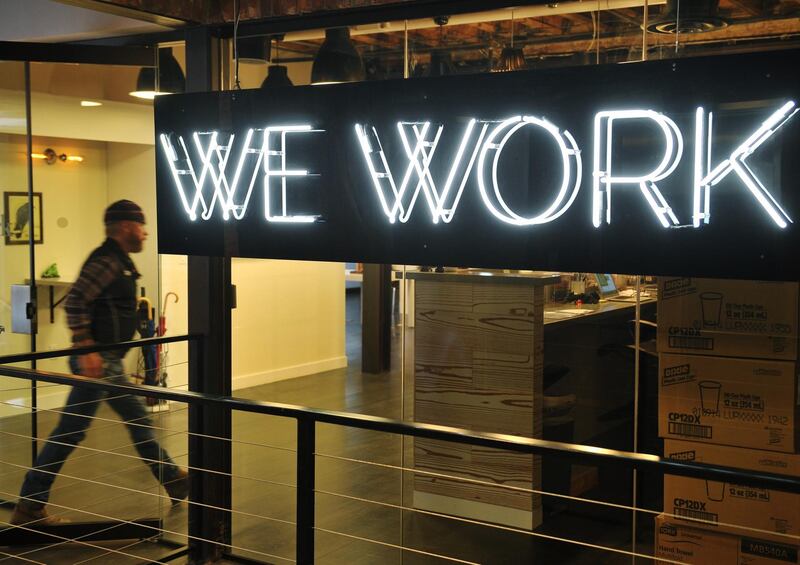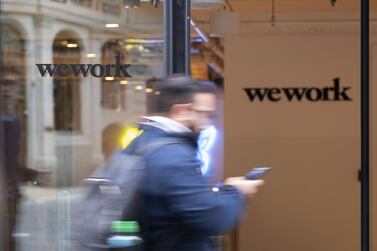Uptown in New York, Mean Girls was looping. Downtown, puppies were frolicking. Across Manhattan and out into Brooklyn, the coffee was flowing.
For all the troubles at WeWork – its grandiose plans gone astray, a hoped-for rescue possibly under way – the mood inside its New York office spaces is surprisingly upbeat.
We Company, as the co-working office space giant is now known, may look like the omnishambles of the unicorn generation of start-ups. But for now, at least, many of its tenants hardly seem to care. In fact, the reaction from more than 20 people was a shrug that said, “Not our problem".
The mood was presumably less sanguine at JP Morgan Chase, which on Friday was said to be leading efforts to arrange $5 billion (Dh18.36bn) in financing to keep We Company afloat. Time is short. Without help, We Company could run out of money by late November.
The financing could start to come together as early as next week, but it may take longer for its structure and terms to be finalised, according to sources.

We Company was one of the year’s most hotly anticipated initial public offerings before doubts about valuations and transparency ended with the IPO’s withdrawal and the company’s top executive losing his job. The fast-growing, money-losing start-up had been counting on a stock listing – and a $6bn loan contingent on a successful IPO – to meet its cash needs.
Now it will pay considerably more to borrow. One option that has been floated is raising $3bn or more of the debt package through the sale of high-yield bonds. Those would likely be priced at a premium to the yield commanded by WeWork's outstanding bonds, which were issued with a 7.875 per cent coupon and offer a yield of around 10 per cent.
SoftBank Group, the largest shareholder in WeWork, is in talks to acquire more shares at a significantly lower valuation than the $47bn WeWork had in January.
Spokeswomen for JP Morgan and WeWork declined to comment.
WeWork’s bonds, which traded above par less than a month ago, have plunged into distressed levels since then, dropping more than 20 cents on the dollar amid mounting concerns about the company’s cash situation before regaining almost half of that decline amid news of the debt talks. Fitch Ratings and S&P Global Ratings have cut WeWork’s credit grade further into junk on liquidity issues.
The potential financial fallout could be huge. JP Morgan has loans out to the company and its founder, while SoftBank has watched its investment plummet in value. But the implications for New York real estate are worrisome too. We became Manhattan’s biggest office lease holder, with more than 650,321 square metres, partly because it was sometimes willing to pay above-market rents.

Since We Company’s brash co-founder, Adam Neumann, abruptly stepped down last month, the company has drastically reversed its growth-at-all-costs strategy. It has moved to sell Mr Neumann’s luxurious Gulfstream G650 and shed other assets and headcount.
The company's new co-chief executives have been moving to slash costs and spin off businesses in the past two weeks in an effort to slow its cash bleed. Analysts had previously estimated the company would run out of money by the middle of next year.
In Manhattan’s financial district, We Company member Brianna Rowe, who has been there for four years, said the WeWork space was one of the perks of her job working for a non-profit.
“It was just so cool, it was unlike anything I had ever really experienced before,” she said.
Nathan Colkitt, who has been renting We space for his architectural company since 2010, said that as long as the place is kept up, he is happy to stay put. We Company's big selling point – flexibility – has turned out to be a blessing for him, if a curse for WeWork.
“The very same thing that made them successful gives you the ability to jump at any month,” Mr Colkitt says. “So that’s sort of ironic or coincidental.”
Rarely has so much gone so wrong so fast for a young company in the spotlight. We has raised more than $12bn since its founding and never turned a nickel of profit. Now, its very future is in doubt. We Company’s travails are bound to shape investors’ views of other fast-growing start-ups hoping to go public.
From Midtown down to Gramercy Park, WeWork members said that for them, it was business as usual. At offices at 750 Lexington Avenue, Mean Girls, the Lindsay Lohan comedy, was playing over and over on October 3, known as "Mean Girls Day". A puppy party broke out at 33 Irving Place, with happy hour to follow, while the spaces at 880 Third Avenue featured a macaroni-and-cheese bar and massages.
For WeWork’s tenants, the financing negotiations and the scramble to cut costs went largely unnoticed or remarked upon.
Robert Snow, another We member, summed up the view: “As far as I can tell, it’s the same as it’s always been.”







